-
 Women's Leadership Building
Women's Leadership Building
WOMEN’S LEADERSHIP BUILDING
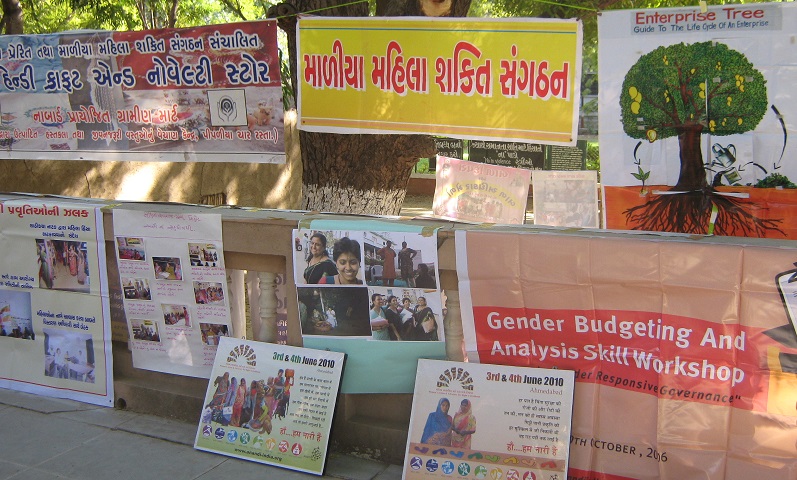
Strengthening Sangathans is a core program and strategy of ANANDI for we believe that change is possible and sustainable only when there are leaders and collectives who believe and implement the change agenda in their contexts. Over the past twenty years ANANDI has formed and built capacities of 7 women’s collectives that are also led by women from economically and socially marginalized communities. Of these three are separately registered bodies – Panam Mahila Bachat ane Dhiran Mandali, Azad Mahila Machimari Sahakari Mandali, and Mahila Swaraj Manch
| Sr. No. | Sangathans | Social categories | Community | District | Block & No of Villages |
|---|---|---|---|---|---|
| 1 | Devgadh Mahila Sangathan And Ratanmahaal Mahila Sajiv Khet Utpadak Mandali | Adivasi and other marginalized socio economically communities | Wage workers, Forest Dwellers, Organic fertilizer and seed producers, Farmers, Health workers | Dahod | Devgadh Baria (45) |
| 2 | Panchmahaals | Ghoghamba (35) | |||
| 3 | Panam Mahila Sangathan and Panam Mahila Bachat ane Dhiran Mandali | Displaced due to the Panam Dam and Women entrepreneurs | Wage workers, | Panchmahaals | Shehara (20) |
| 4 | |||||
| 5 | Maliya Mahila Shakti Sangathan And Azad Mahila Machimari Sahakari Mandali | De-notified Tribal community – Minority Community Tribal migrant agriculture workers | Fisher women, wage workers, Livestock keepers, salt pan worker, entrepreneurs | Morbi (earlier Rajkot) | Maliya(Miyana) (20) Morbi (10) |
| 6 | |||||
| 7 | Mahila Swaraj Manch | Women leaders in PRI, women leaders from other marginalized communities. | Elected Women Representatives and Dalit and Other Back Castes ( OBC) | Bhavnagar | Shihor, Umrala (50) |
OVERALL STRENGTHS OF THE SANGATHANS SUPPORTED BY ANANDI
- Committed leadership of women that emerged from the most vulnerable and oppressed communities , truly representative of the caste and class of the membership base
- Primary systems of governance in place (to list a few regular meetings of vikas samiti, cluster level meetings, executive committees in place , bank account, membership register, planning meetings)
- Understanding of human rights, gender rights and equality and inter-sectionality of issues such as food, health, violence, livelihoods, education, property rights
- Value principles of transparency and accountability and have used the “Social audit”, “Jan Sunvai” process as community accountability systems
- Collective action on issues of right to food, health, work, housing, land and Violence Against Women
- Many women leaders are in the positions of power in Gram Panchayat, statutory bodies and “Nyay Samiti”
- Ability to negotiate and deal with govt agencies and political and social leaders
- Some amount of collective assets and finances for their own activities and struggles
Forming women’s collectives and working towards changing the nature and direction of systemic forces which marginalise women has been an integral component of ANANDI’s work in Gujarat. ANANDI engages with women from low income groups such as the tribals, migrant families, salt pan workers, marginal farmers, farm and construction labour and fishing community. ANANDI organises these women in collectives to become active agents of change to improve their living conditions and develop sustainable livelihoods.
The organization lays a strong emphasis on collective processes, and an empowerment approach to achieve safety and security rights of women and gain greater control over their livelihood security.
THE MODEL THAT HAS WORKED
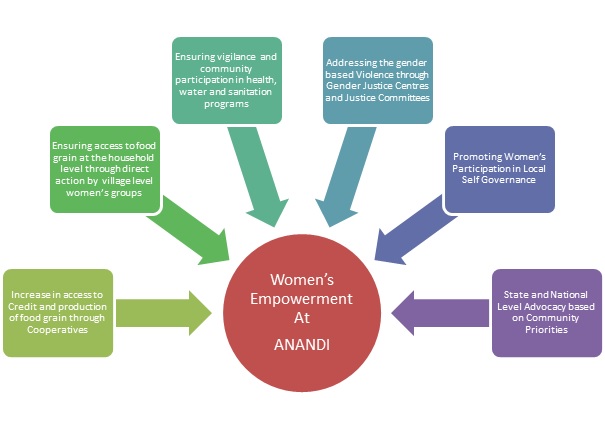
HIGHLIGHTS FOR EACH SANGATHAN DURING THE YEAR 2014-2015
1. DEVGADH MAHILA SANGATHAN
This year the District Police of both Panchahaals and Dahod requested that the folk theatre team of Devgadh Mahila Sangathan (DMS) should perform their play “ Koi Ben Dakan Nathi” ( No woman is a witch) in more than 50 locations to spread awareness about the violence committed on women in the name of witch branding. The police would organize the travel of the entire team from their village to the location and also drop them. Banners were put up by the police publicizing the police stand and support to the long standing demand of the sangathan. The local police would not register cases of witch branding under the pretext that this is superstition and so it is a local community issue. By sponsoring these shows the police have indicated their commitment to deal with the issue.
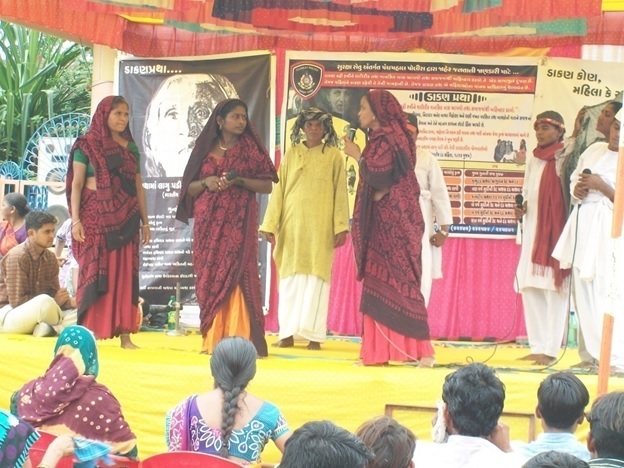
2. RATANMAHAAL MAHILA SAJIV KHET UTPADAK MANDALI
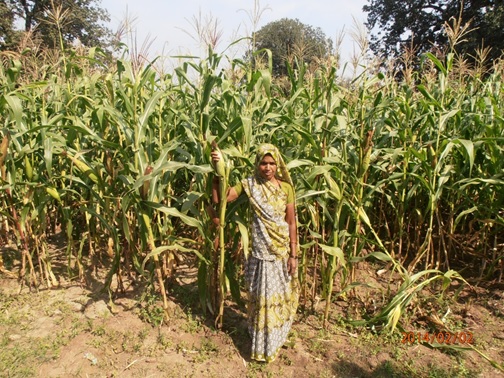
This is a separate body created by DMS and ANANDI to specifically address the issues of women farm producers, forest produce collectors. The idea is to register it to undertake economic activities. This year this mandali supported over 250 women farmers to undertake sustainable agriculture from the food security point of view. This year was the sixth year in a row when they put up a stall in the IIM traditional food festival in Ahemdabad and they made profit of Rs. 53370/- in three days. Their total income was Rs.87020/-.
Over the past few years ANANDi has facilitated linkages with the Anand Agricultural University to provide the technical inputs and certify the seed production of the Maize – 6 variety developed by the university. Women farmers, small and marginal farmers are given priority as it has dual impact – it gives them better remuneration as well as ensures availability of seeds of the food grade maize in the local market.
Each month on an average, about 150 women farmers join meetings to plan for their activities as women farmers and deliberate on the farming practices and influence the choices made by their families on what need to be grow on their farms. They are also encouraged to seek government support as women farmers.
3. MALIYA MAHILA SHAKTI SANGATHAN
MMSS was created after the 2001 earthquake of Kutch. The women had led the rehabilitation efforts that ANANDI undertook in over 25 villages. Subsequently the women decided to form their own organization to shape and influence the development of women in their blocks. Today there are over 1000 women in this sangathan and they have the most successful among all the ANANDI supported sangathans to independently support the Self Help Groups at the village level. In the year 2014-2015 the MMSS set itself the target to access maximum funds from the government program the Mission Mangalam which aims to empower women through village level mahila mandals and their federations. The MMSS team made sure that their SHGs fulfilled all the criteria as stated by the government programs and with the support of ANANDI submitted the required documents to avail of the funds.
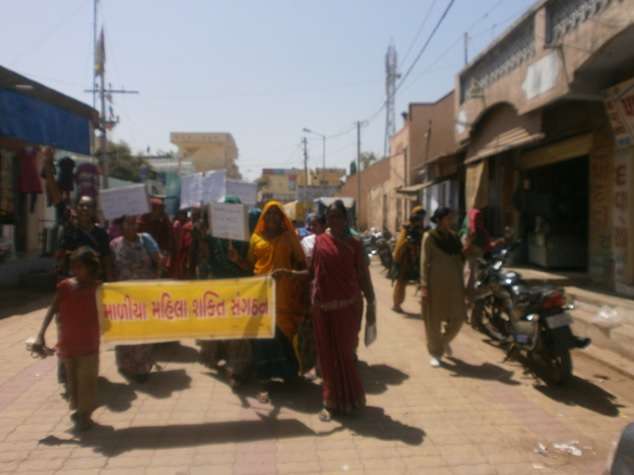
There are strong linkages with the nationalised banks whereby the accreditation process of the self help groups is accepted by the banks which further provides loans for SHGs. The MMSS team ensure that the members understand the value of credit and regular repayment and follow the norms to ensure rotation of funds and a good track record of savings and credit. The ANANDI team helps with maintaining records.
MMSS works with the Miyana community a de-notified nomadic tribe that has come to settle down in the very harsh ecological conditions. They engage in rain fed farming, salt harvesting and prawn harvesting – all dependent on the nature and hence highly erratic. This community has been a neglected community to such an extent that they have themselves internalized negative attitudes about themselves. As result they don’t demand government services such as schooling, health and roads and the local officials disregard their duties saying that this community does not deserve it. As a result there are practically no decent schools and non existent health serices. The MMSS has taken the responsibility with ANANDI to identify health workers who have been educating the women about the need for institutional delivery, ensuring adequate nutrition for children. In the last year from practically no institutional delivery at the beginning about 60% of all deliveries took place in the Community Health Centre at Maliya.
The Nyay samiti of the MMSS is a strong women led alternative legal redressal mechanism where the women leaders deal with cases of domestic violence. Instead of having to go the courts which entangle the women into lengthy procedures and huge expenses, this forum calls upon both the parties – takes down case details – makes home visits to verify details and counsels both parties – keeping two principles in mind – interest of woman and providing the woman the strength required to take her own decision. This involves several confidence building dialogues till the woman is clear about what she really wants. The leaders of Nayay Samiti have regular meetings to review the cases, the place the dilemmas they face and sharpen their own ability to offer arbitration and counselling. The Nyay Samiti in conjunction with the leaders of MMSS develops themes of campaigns which includes street marches, poster based discussion and providing information on any new laws, amendments that would have come about.
4. AZAD MAHILA MACHIMARI MANDALI
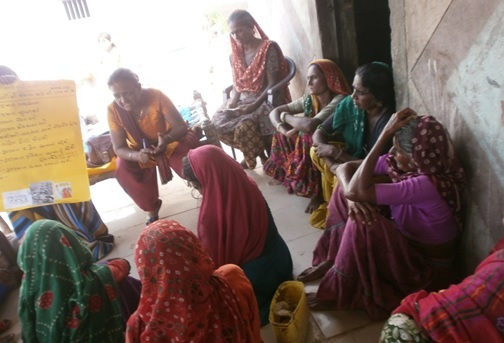
This is a registered cooperative of women engaged in various fish related particularly prawn harvesting activities. All the women belong to the Miyana community and follow Islam. Despite the extremely hardworking women, they have practically no control over the pricing of their produce. By registering as a separate cooperative they are able to negotiate better with the middlemen – infact they have removed two levels middlemen which has led to increase in incomes which is still not very high but neither is it insignificant.
In the last year the cooperative has been able to work with the Fisheries dept who has agreed to allocate housing funds for them, starting setting up regular office at the block level to issue licences for fishing and the address other issues of the fishing community.
Addressing the health concerns of the women and young children has been an intensive program for which the sangathan has now developed a cadre of trained bare foot health animators who educate the women and families, support better nutritional practices and better maternal health care. They simultaneously also act as pressure group to seek better service delivery from the public health care department.
5. PANAM MAHILA SANGATHAN AND PANAM MAHILA BACHAT ANE DHIRAN MANDALI
This sangathan decided five years ago that they wanted to formalize their saving and credit activities by registering a cooperative – the Panam Mahila Bachat ane Dhiran Mandali. Each year they hold an annual general body meeting where they release their annual accounts and also report on the social activities they would have undertaken. This year the Mandali decided to change their office bearers as per the requirements of the law.
Trainings have been conducted with members to educate them about the role as cooperative share holders – about 23 such trainings were held in which 1299 women participated. 12 trainings were conducted with prospective creditors where 58 women participated.
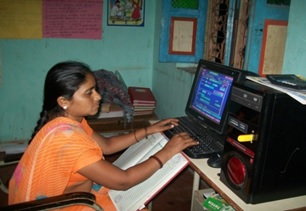
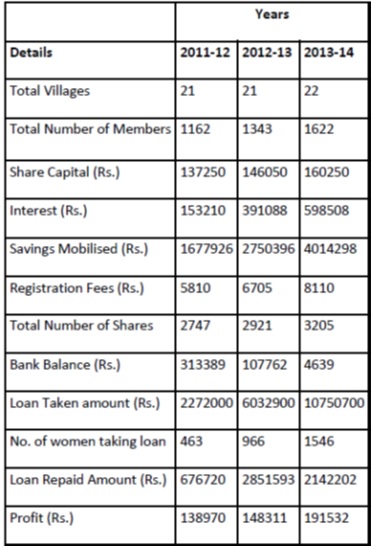
6. MAHILA SWARAJ MANCH
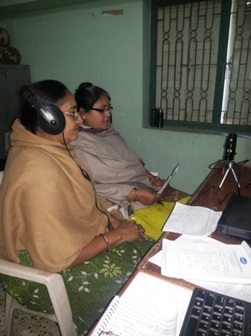
This is a registered organization that works to strengthen the elected women representatives and to ensure that the needs of poor womenand marginalized communities are addressed through the panchayati raj systems. In doing so this organisaton is becoming a model of how the panchayati raj can be address women’s issues. This organization is led by women of Shihor block of Bhavanagar district and majority of them have held places in the panchayats as sarpanch or as members.
Last year the ANANDI and Mahila Swaraj Manch worked together to introduce new technologies such as mobile based IVRS – Interactive Voice Recorded Systems, making video films, using the still camera to further their agenda. The local team were trained in making video films right from conceptualtising to shooting, to editing and making the final product. There were several technical glitches but he team did not give up and were able to shoot for about 4-5 films on topics such as role of sarpanch in ensuring good education, providing water and sanitation, and addressing domestic violence. In March 2014 they still had to master the final editing and putting the titles and mixing music.
The women were trained in recorded voice messages and sending out bulk messages through the computer to the elected women and women leaders of Shihor block. They sent out messages about the upcoming gram sabhas and urged the women to attend the same, the new schemes announced by the government and the documents required to avail them.
CONCLUSIONS
Over a period each of the Sangathans have gained new competencies and recognition in their own area and there is need for space for them to work / function independently .
Each of the sangathans are a key partner in the model of Lok Adhikar Kendra developed by ANANDI. The role of the sangathan is to make the people aware of their entitlements, schemes and document they need to establish their citizenship and eligibility. Secondly they are the ones who bring to the notice where the state has failed for instance the MNREGA not functioning properly, the PDS system not functioning properly. Based on this the Lok Adhikar Kendra offers technical support through training by ANANDI, and planning for campaigns. Some of the campaigns that have been led by the sangathans are:
- Devgadh Mahila Ssangathan: Roji Roti Lok Jumbesh – Right To Food and work , Access to Social security entitlements, Violence Against Women (VAW), Implementation of Forest Rights Act, Women’s Access to land rights, Women’s participation in Gram sabha ( general council of the village).
- Panam Mandali: Roji Roti Lok Jumbesh – Right To Food and work, Campaign for VAW, Women’s participation in Gram sabha
- Ratanmahal Mahila Sajiv Khet Utpadak ane Vechan Mandali (Ratanmahaal Women Organic Producers Cooperative): Women farmers’ Rights and Entitlement, Women’s Land rights, Ensuring Food security and income security especially for small and marginal farmers, single women.
- Maliya Mahila Shakti Ssangathan: Campaign for VAW, Right to Food , Women’s participation in Gram sabha, Women’s land rights and housing
- Azad Mahila Machimaari Mandali (Azad Fishing women’s Cooperative): For ensuring access to basic amenities on their work sites, accessing government licensing services, and other benefits for small family based fishing activities.
- Mahila Swaraj Manch (Forum of Women seeking accountable governance): Women’s participation in Gram sabha, right to food, housing and VAW.
WAY AHEAD
The sangathans are in varying stages of their life cycle – some as old as 13 years some as young as 5 years. Each of them have so far received capacity building support through program funding is specific sectors like health, livelihood, gender justice and so on but in the past 10 years few doors have supported direct grass roots mobilization and strengthening the internal structures of the sangathans – i.e. in cadre building, skill building, perspective building.